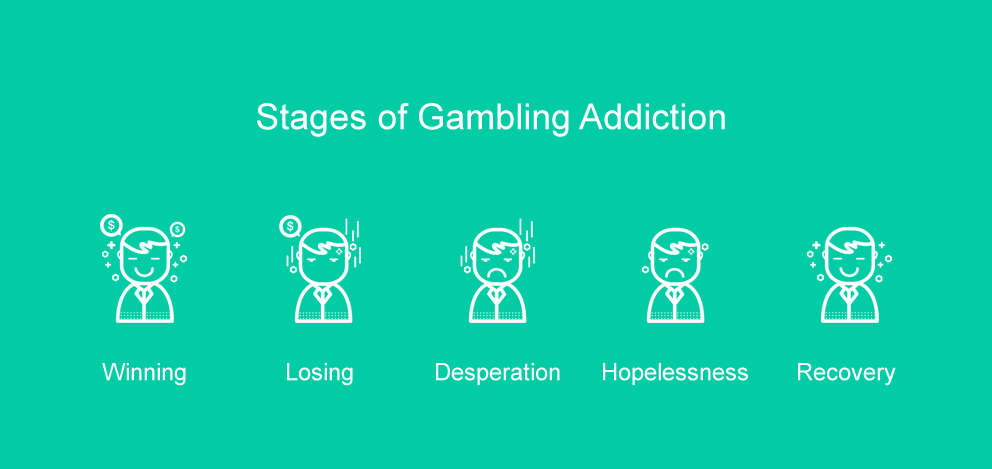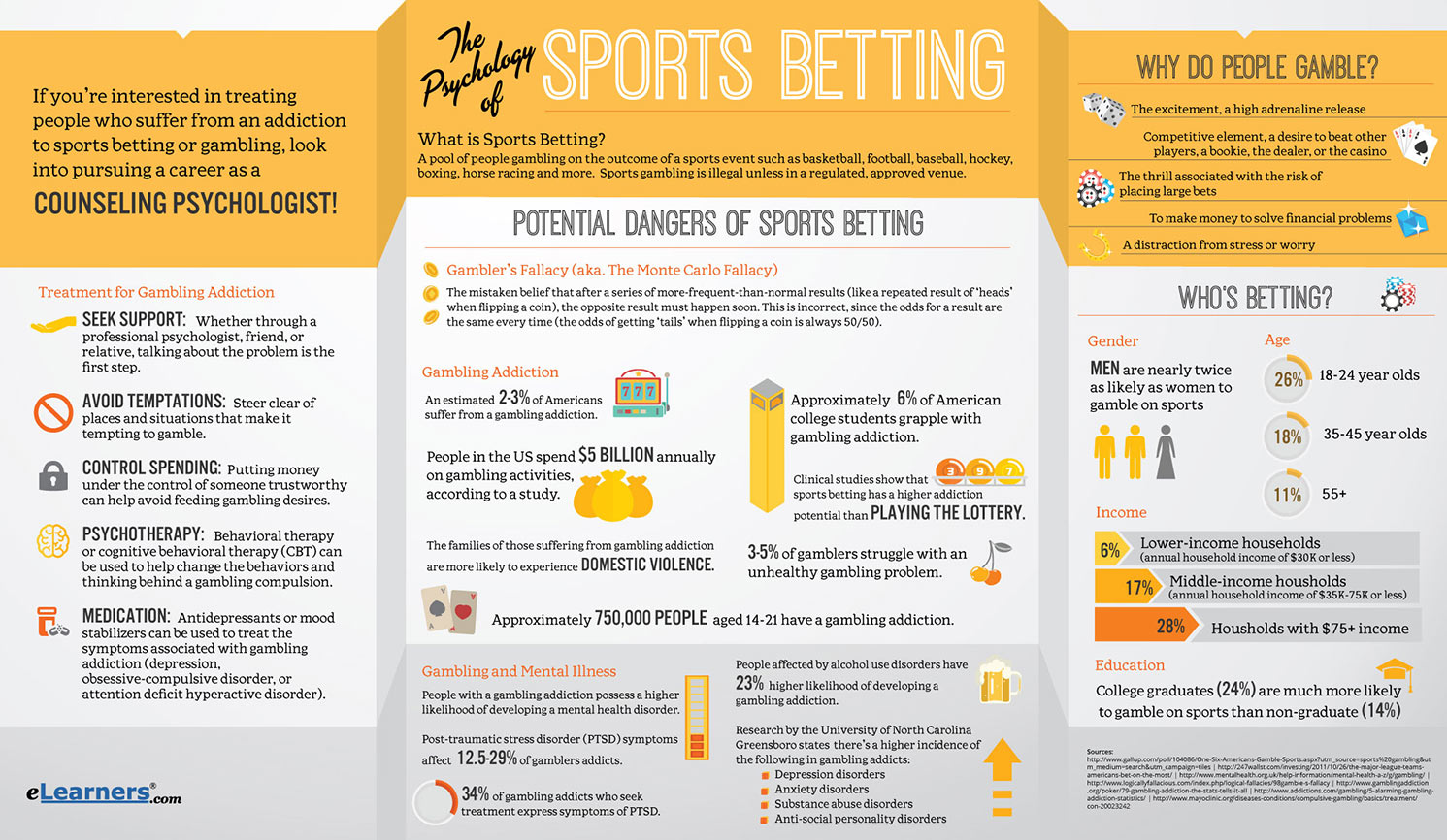Gambling Psychological Disorder
Personality disorders. Problems with gambling may occur in individuals with antisocial personality disorder and other personality disorders. If the criteria are met for both disorders, both can be diagnosed. Other medical conditions. Gambling disorder involves repeated problematic gambling behavior that causes significant problems or distress. It is also called gambling addiction or compulsive gambling. For some people gambling becomes an addiction – the effects they get from gambling are similar to effects someone with alcoholism gets from alcohol. Gambling disorder (GD) has been associated with other categorical psychiatric diagnoses: attention deficit hyperactivity disorder, depression, bipolar disorder, social anxiety, schizophrenia, substance use disorder, antisocial personality disorder; and dimensional symptoms including higher impulsivity, poorer emotional wellbeing, cognitive distortion, psychosis, deficient self-regulation, suicide, poorer family environment, and greater mental distress. Psychological disorders can play a role in the formation of any addiction. This includes gambling addiction. Sometimes these problems preceded the addiction and the addiction served as a coping tool. Sometimes they developed after addiction. Gambling Disorder (GD) is considered a heterogeneous, multidimensional pathology with high personal and social consequences. The transition time (TT).
According to the Diagnostic and Statistical Manual of Mental Disorders – Fifth Edition, gambling disorder is a condition characterized by persistent problematic gambling behavior that leads to clinically significant impairment or distress. Roughly 2 percent of the U.S. adult population has a gambling disorder, and current estimates of prevalence in the military are even lower, in the range of 0.3 – 1.2 percent. However, due to concerns about potential gambling problems in the military population, there are major efforts underway to screen everyone across the military for a gambling disorder. This sounds good in theory; gambling disorders are serious and are associated with bankruptcy, criminal behavior, domestic violence, and increased risk for suicide. In practice, however, universal screening may not be simple to implement. Several factors need to be considered:
1. Are accurate screening instruments readily available?


2. How common are gambling disorders in the military?
3. What are the consequences of screening?
Psychological Disorders Definition
The Psychological Health Center of Excellence recently published a systematic review in the Journal of Clinical Epidemiology which evaluated the accuracy of screening instruments for gambling disorder. After reviewing more than 16,000 articles, we found that:
- Only three screening instruments for gambling disorder had been adequately validated, and none of these instruments had been tested on a military or veteran population.
- The accuracy of all three instruments was generally low, and they had the potential to misclassify a large proportion of service members screened.
We tested how well the three screening instruments would perform on a population of 1.3 million active-duty service members. Using the most conservative of the three screening instruments, we found that 97 percent of service members who screened positive actually would NOT have a gambling disorder. If universal screening was deployed, that means that almost 994,000 service members without gambling disorder likely would be identified as having the disorder and would need follow-up assessments and potentially be referred for care.
This is not unusual. In order to identify a small number of cases with a rare disorder, universal screening for a rare condition commonly results in thousands of people being falsely identified as potentially having that disorder. Our paper discusses strategies to improve screening efforts including screening only those service members who have other conditions that make them already at higher risk or who are stationed in military areas with high concentrations of known gambling problems. See this poster presentation for more on the behavioral, demographic and proximal risk factors for pathological gambling in the military community.
Our review concludes there is a lack of adequate evidence to support population-level screening for gambling disorder using current instruments. More rigorous research on screening instruments is needed using adequate reference standards, generalizable study populations, and outcomes related to the downstream effects of screening.

Learn more about gambling problems, treatment options, self-help tools, and resources to help veterans overcome gambling-related issues at Make the Connection.
Psychological Disorder Quiz
Dr. Belsher is the chief of research translation and integration at the Psychological Health Center of Excellence. His primary areas of focus include deployment-related mental health, systematic review methodologies, health services research, dissemination of evidence-based mental health practice, and collaborative care.
Dr. Otto is a contracted senior epidemiologist supporting the Psychological Health Center of Excellence. She serves as a subject matter expert for health services population research, evidence synthesis, and research gaps identification and prioritization.

The views expressed in Clinician's Corner blogs are solely those of the author and do not necessarily reflect the opinion of the Psychological Health Center of Excellence or Department of Defense.
Excessive gambling can drain finances, ruin personal and professional relationships, and harm the gambler’s mental health. Gambling disorder affects about 1% of Americans who can’t stop, despite the consequences. Gambling covers more than a trip to the casino or an illicit poker game – it includes lotteries, online poker, and sports betting, and there's a debate over whether it also includes daily fantasy sports leagues.
Yale Medicine is a leader in gambling disorder treatment research, with one of two Centers of Excellence in gambling research in the nation financed by the National Center for Responsible Gaming located at Yale. We take a multidisciplinary approach, including brain imaging, pharmacology, and genetics, to investigate the neurobiology and treatment of gambling disorder.
Risk factors for gambling disorder may include:
Psychological Disorder Movies
- Sex. Men are more likely to have gambling problems than women, but the disparity seems to have narrowed in recent years. Men appear more drawn to such strategic forms of gambling as card games or sports betting, while women tend to prefer such non-strategic forms as bingo or slot machines.
- Age. Two to 7% of youths develop a gambling disorder, compared with about 1% of adults, and many gambling disorders begin in adolescence. College students also gamble at higher rates than the general population.
- Family. People who have a parent with a gambling problem are more likely to have problems too. Yale research is working to understand the connection between genetics and gambling disorders. It’s estimated that a gambling disorder’s development is 50 percent due to genetic factors and 50 percent due to environmental factors.
- Other behavior or mood disorders. People with gambling disorder often abuse alcohol, tobacco, or other drugs, have mood or personality disorders such as schizophrenia or antisocial personality disorder, or have attention deficit hyperactivity disorder (ADHD). A 2008 study showed that people with psychiatric disorders are 17 times more likely to develop gambling problems.
- Personality traits. People who tend to be restless, easily bored, extremely hard-working, or very competitive may be at greater risk of developing gambling disorder.
What’s the difference between enjoying gambling and gambling disorder?
Most adults who gamble do not have a gambling disorder, but those who do can face very serious problems. An afflicted gambler may deplete savings, borrow money, or liquidate retirement accounts to finance their gambling, damage personal relationships (especially with a spouse and family), and have troubles at work. People with a gambling disorder often feel guilt or shame and may experience such withdrawal symptoms as restlessness and irritability when attempting to stop gambling.
Many people may take gambling lightly, not realizing that it may be addictive in many of the same ways as drugs are. Gambling problems can be very harmful to affected individuals and their families.
People who, over a 12-month period meet four of these nine criteria devised by the American Psychiatric Association, are considered to have a gambling disorder:
- Need to gamble with increasing amounts of money in order to achieve the desired excitement
- Are restless or irritable when attempting to cut down or stop gambling
- Have made repeated unsuccessful efforts to control, cut back, or stop gambling
- Are often preoccupied with gambling (e.g. having persistent thoughts of reliving past gambling experiences, handicapping or planning the next venture, thinking of ways to get money with which to gamble)
- Often gamble when feeling distressed (e.g. helpless, guilty, anxious, depressed)
- After losing money gambling, often return another day to get even (“chasing” one’s losses)
- Lie to conceal the extent of involvement with gambling
- Have jeopardized or lost a significant relationship, job, or educational or career opportunity because of gambling
- Rely on others to provide money to relieve desperate financial situations caused by gambling
What are the treatment options for gambling disorder?
There are three main forms of interventions:
- Psychotherapy. Individual and group approaches such as cognitive behavioral therapy, which helps to identify and modify damaging thinking and behavior, can help people overcome the problem. Another method is motivational interviewing, which helps to turn ambivalence about quitting into motivation to quit and can help patients combat urges to gamble.
- Medications. There are multiple potential pharmaceutical approaches to treatment, although no medication has an FDA indication for gambling disorder. Such opioid antagonists as naltrexone and nalmefene, which may reduce cravings for alcohol, have been found in randomized clinical trials to be superior to placebo in the treatment of gambling disorders. The antidepressant and antianxiety medication escitalopram may help decrease anxiety and problem-gambling severity in people with co-occurring anxiety and gambling disorders. The mood stabilizer lithium has been shown to reduce mania and problem-gambling severity in individuals with co-occurring bipolar-spectrum and gambling disorders. However, most medication trials have been relatively short-term and have involved small sample sizes.
- Support groups. Some people with gambling disorder find help with such groups as Gamblers Anonymous, a 12-step program dedicated to abstinence. Participants meet and share experiences, supporting each other in their efforts to abstain from gambling.

What makes Yale Medicine’s gambling disorder research unique?
Yale’s Center of Excellence in Gambling Research, one of two such centers in the nation, is supported by the National Center for Responsible Gaming and conducts groundbreaking research into gambling disorder.
The Center, directed by Yale Medicine psychiatrist Marc Potenza, MD, PhD, has conducted the first brain imaging studies on people with gambling problems. The functional imaging investigations, along with volumetric and neurochemical studies, have found that the brain acts similarly during monetary reward processing in individuals with gambling disorder as it does in people with binge-eating, alcohol-use and tobacco-use disorders. Yale Medicine research has made advances in understanding the effects of such opioid antagonist medications as naltrexone and nalmefene on gambling problems (including planning and participating in the largest multi-center, randomized clinical trial thus far to investigate pharmacotherapy for treating gambling disorder). The Yale Center has also investigated gender-related differences in gambling behaviors and disorders. Next for the Center is tracking the brain’s activity during effective behavioral and pharmacological treatments.
Dr. Potenza is also director of the Problem Gambling Clinic, a collaboration between the Yale Department of Psychiatry and the Connecticut Mental Health Center, which treats patients and conducts research into gambling disorder. He is also a consulting psychiatrist for and medical director of the New Haven component of the Bettor Choice program operated through The Connection.